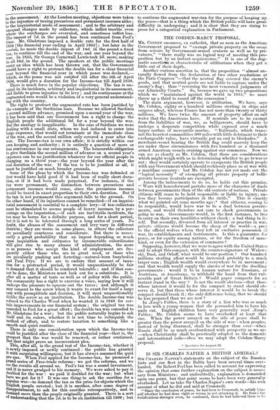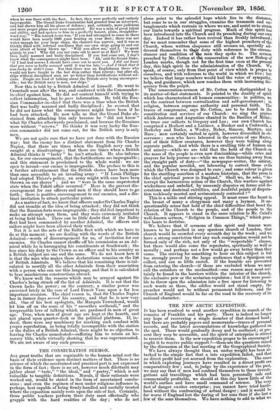IS SIR CHARLES NAPIER A BRITISH ADMIRAL? Sim Canairms NAPIER'S
statements on the subject of the Russian forts and our fleet in the Baltic have been several times over- hauled. Sir Robert Peel has been called to. account for expressing the opinion that some further explanation on the subject is neces- sary from Ministers ; and undoubtedly, explanation is demanded upon, one point, but that point seems to have been very generally overlooked. Let us take Sir Charles Napier's own words—his, own account of what he did and said at Cronstadt "Since the conclusion of peace, he had been to Cronstadt, to utility him- self whether he had done right or wrong in not attacking it. He found the fortifications stronger even, he confessed, than he had believed them to be
when he was there with the fleet. In fact, they were perfectly and entirely impregnable. The Grand Duke Constantine had granted him an interview, and had shown him all his plans of defence and, certainly, more judicious and more proper plans never were conceived.' He was a man of great talent and ability, and had spoken to him in a perfectly honest, plain, straightfor- ward way." "His remark to me was, If you had attempted to come in there would have been nearly 1000 guns bailing on your fleet ; there was not water enough for your large ships, the channel was narrow, and it was so thickly filled with infernal machines that our own ships going in and out were afraid of being blown up.' 'Will you allow me,' said I, to speak plainly to you ? Why did you not come out to meet us at Kiel ? We were then, badly manned and badly disciplined. If you had come out, I don't know what the consequences might have been.' ' Ah,' said the Grand Duke,
if I had had screws I should have come out to meet you. I did not know that you were so badly manned until it was too late.'—And I think that it was lucky he didn't come. Not that there was an Englishman there who would not have fought to the last drop rather than retreat ; but after all, ships without disciplined men are no better than fortifications without sol- diers. People are fond of talking about the British navy being unconquer- able; but the British navy is men, not ships."
Now this is told by a British Admiral of himself. He went to Cronstadt soon after the war, and conferred with the Commander- in-chief against him. He did not content himself with trying to collect information, but he gave information. He told the Rus- sian Commander-in-chief that there was a time when the British fleet was badly manned and badly disciplined ; he avowed that he did not know what the consequences might have been if he had been attacked. He now tells us that the Grand Duke ab- stained from attacking him only because he "did not know" what Sir Charles afterwards proclaimed, and because the Russians were without "screws." Be thinks it was very lucky the Rus- sian commander did not come out, for the British navy is only men.
We are not quite sure that we have yet done with the Russian war ; but the enemy has a distinct statement from Sir Charles Napier' that there are times when the English navy can be caught at a disadvantage ; that there are times when a British Admiral thinks it " lucky " he isn't attacked. He also informs us, for our encouragement, that the fortifications are impregnable ; and this statement is proclaimed to the whole world : we are open to inroad—our enemy is impregnable. The preface to this is a further advertisement that the British shores have been more than once accessible to an invading army : "If Louis Philippe had adopted Thiers's policy, an army might with ease have been thrown on our shores "and we "were in the same unprotected state when the Tahiti affair occurred." Here is the gravest dis- couragement for our officers and men if they should have to go forth ; there is positive encouragement to our enemies, and a dis- tinct invitation to attack particular points. As a matter of fact, we know that officers -under Sir Charles Napier did not tremble at the idea of being attacked ; they did not think that the Russian forts were impregnable ; they did feel impatient to make an attempt upon them, and they were extremely irritated at being held back. There can be little doubt that if the Baltic fleet had been commanded by another Admiral, the officers and sailors might have been allowed their wish. But it is not the acts of the Baltic fleet with which we have to do at this moment ; we are dealing with the words of the British Admiral—words of discouragement for us,. of invitation for our enemies. Sir Charles cannot shuffle off his commission as an Ad- miral while he is haranguing his constituents at Southwark ; the le.ss since his duty to the Crown as an officer and to his country as a British subject are one and the same. We do not know how it is that the man who makes these declarations remains on the liet of British Admirals. We believe that his rems ;fling there is 'dal- culated to mortify all the other Admirals from their association with a person who can use this language, and that it is calculated to bear mischievous constructions abroad.
We know well the reasons which may be arrayed against Sir Charles's being struck off the list of Admirals. It is not that the Crown lacks the power ; on the contrary, a similar power was exercised lately in the case of Lord Ernest Vane upon a far less important occasion. The chief reason is, that Sir Charles Napier has in former days served his country, and that he is now very old. One of his best apologists, the Marquis Townshend, would let him off on the score of his " cacoethes scribendi," and the irrepressible love of talking which are pardoned in men of great age. True, when men of great age are kept at the hearth, and not placed upon quarter-deck or the political platform. If, in- deed, there were any machinery for marking such conduct with proper reprobation, as being totally incompatible with the station or the duties of a British Admiral, there might be no objection to leaving Sir Charles unmolested—suffering him to retain an ho- norary title, while virtually showing that he was superannuated. We are not aware of any such process.



























 Previous page
Previous page